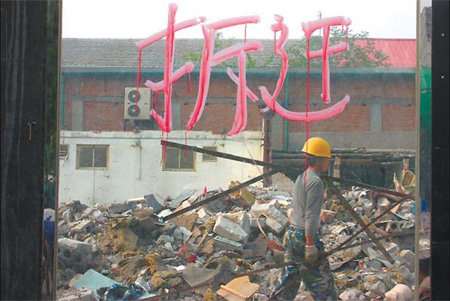Government and Policy
Owners to get say in relocation
By Wang Jingqiong (China Daily)
Updated: 2010-01-22 08:02
 |
Large Medium Small |
Changes in housing regulation to better protect property rights
|
 A demolition site in Beijing is seen in this undated file photo. [Wu Changqing/China Daily] |
Property owners' rights will soon receive better protection under revisions to the controversial regulations for demolishing urban housing, a senior legislative official said yesterday.
"We will soon publish the draft revision to solicit public opinion and will further explain the changes," Gao Fengtao, deputy director of the State Council Legislative Affairs Office, the agency that issued the existing regulation, told China Daily.
The office invited eight experts to give opinions on the draft version on Wednesday. According to Shen Kui, a law professor from Peking University and one of the eight experts, the revision emphasized that confiscation of houses and relocation of residents could only be done in the public interest.
"The new draft version will include a detailed regulation on confiscation for non-public interest, which is more complicated," said Shen. "When the developer and the property owners are involved in confiscation and compensation, the government is also involved as the change of land use needs permission from the government."
In addition, the draft revision contains more detailed procedures for confiscation and compensation to answer complaints that property owners have little say in either under the current regulation.
Confiscation should be announced to the public at least 30 days in advance, during which time public hearings should be held, said Jiang Ming'an, another scholar who attended the hearing. "And the government can only start confiscation if there's no major disagreement from the public."
Another change is that the draft revision says owners can sue if they do not agree with the confiscation, and the government cannot force demolition or ask residents to move while the lawsuit is ongoing. The current regulation allows the government, or estate developers with permission of the government, to force demolition even if a lawsuit is going on.
"Previously, a lot of people did not sue because even if they did, their houses would still be destroyed," said Jiang.
The new regulation stipulates that compensation should be decided by market price, not by the government, which means in practice the two parties should choose a third agent to determine the property value.
The current regulation allows the government to seize homes and land if they are needed for important projects.
It also stipulates that residents must move out once the government issues a relocation permit, with a maximum period of a year and a half allowed for residents to relocate and negotiate compensation.
But what happens in most cases, experts said, is local governments give developers permission to begin work and leave the companies to negotiate with residents. If residents refuse to move, they are usually forced out.
Experts believe the current regulation has caused a lot of conflict and tragedy, especially the death of Tang Fuzhen, from Chengdu, the capital city of Sichuan province, who shocked the nation by setting herself on fire on Nov 13 to protest the forced demolition of her former husband's garment processing business and living compound.
Tang died from her injuries 16 days later at a local hospital. The building she wanted to save has been torn down.
Five law professors claimed in an open letter on Dec 26 that the current regulation should be abolished or revised because "it is against the Constitution and property law which protects people's property."
The letter caused heated discussion across the country and pushed forward the legislation.












